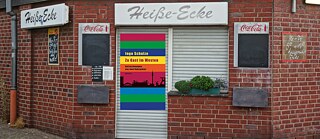Ingo Schulze spent six months exploring the Ruhr area. Not only did he discover many new things there, but also some things that connect this part of the West with the East.
With state elections in Brandenburg, Thuringia and Saxony due to take place in September, there is a lot of focus on the East, mostly fuelled by fear in view of the expected electoral success of the AfD. Writer Ingo Schulze, who was born in Dresden in 1962 but has lived in Berlin for a long time, now looks back in his new book Zu Gast im Westen (As a guest in the West).At the invitation of the Brost Foundation, Schulze was the "Metropolenschreiber Ruhr" from October 2022 to March 2023. In this project, selected authors are to take a look at the Ruhr area from the outside, they are to "question the routines and certainties of the everyday inside view as well as clichés and open up new perspectives", according to the project website.
"Rich as shit"
Schulze originally wanted to write a novel during this time. But things turned out differently. He accepted various invitations and got to know very different people, from ex-police chiefs and primary school headmasters to former refugees from East Germany. Zu Gast im Westen therefore consists mostly of the stories of these encounters. Schulze's method was basically not to have any: "If someone invited me, I went. There is hardly a more unsystematic approach ... In return, every invitation immediately gave me a personal connection, and there were always suggestions associated with it."Football - Schulze is a Borussia Dortmund fan - is the starting point for his encounters on several occasions. For example, he meets former Essen police chief Frank Richter in the pouring rain at a third division home game of Rot-Weiß Essen. He lectures Schulze eloquently on the subject of clan crime, but also remarks in typical Ruhr area self-mockery: "My wife would say I'm such a blabbermouth." Schulze visits the Schalke fan cemetery with Olivier Kruschinski, a devoted Schalke fan who offers guided tours of Gelsenkirchen's most famous neighbourhood. He enjoys listening to Kruschinski's explanations and is fascinated by his vivid and catchy narrative style. "Until the mid-sixties, they had the biggest tax revenue here, the Ruhr area was 'rich as shit'."
United in structural change - and yet different
Schulze also delves into the history of the Ruhr area. While attending a classical concert in the Alfried Krupp Hall of the Essen Philharmonic, he wonders why a festive room is named after an industrialist who was sentenced to 12 years in prison for the use of forced labour and looting during the Nuremberg trials. In the sequel, Schulze tells the story of the Krupp Group and is particularly fascinated by the labour disputes in 1987, when the company management decided to close the Krupp steelworks in Rheinhausen and fire thousands of workers. A highly publicised speech by plant manager Helmut Laakmann led to the longest industrial dispute in the history of the Federal Republic of Germany, including a storming of the famous Villa Hügel, the Krupp family home in Essen. Schulze even gains something from the naming of the concert hall, as it reminds us "that we have benefited, benefit and will benefit from both the good and the terrible, because even when we think we are listening to a symphony concert alone ... the contradictions and shortcomings of our country are always present."Of course, the structural change in the Ruhr area reminds Schulze of the economic collapse of East Germany after German reunification. Despite all the similarities, such as deindustrialisation and emigration, it should not be forgotten that the structural change in the Ruhr area lasted for decades, while the number of jobs in the manufacturing sector in eastern Germany almost halved within two years after reunification.
However, Schulze not only observes the people he meets, but also himself. He often automatically starts talking about the East and describing the differences: "Especially at the beginning, I noticed that as soon as I was asked about my impressions of the Ruhr area, I started talking about the East, as if I had misunderstood the question."
A very likeable guest
Ingo Schulze is a very approachable, likeable guest in the West. On almost every page of his book, you can sense that he felt at home among the people of the Ruhr, indeed, he would have liked to have spent even more time in the region. In this respect, the West can learn something from "Ossi" (a nickname given to former residents of East Germany) Schulze: to take an open, interested and, despite all criticism, benevolent look at others.Accordingly, Schulze's book ends with a humorous anecdote: back in Berlin, he receives an email from a food supplier from the Ruhr area with the slogan "We miss you!" Schulze feels the impulse to reply, "because I felt the same way. Of course, I should have explained that I didn't mean the delivery service, but wanted it to be understood more generally, Mülheim, Essen, Duisburg, Gelsenkirchen, Dortmund, Bochum, Oberhausen, Herne, Bottrop, just the Ruhr area.
Ingo Schulze: Zu Gast im Westen. Aufzeichnungen aus dem Ruhrgebiet
Göttingen: Wallstein, 2024. 344 p.
ISBN: 978-3-8353-5583-5
You can find this title in our eLibrary Onleihe.
Göttingen: Wallstein, 2024. 344 p.
ISBN: 978-3-8353-5583-5
You can find this title in our eLibrary Onleihe.
08/2024
